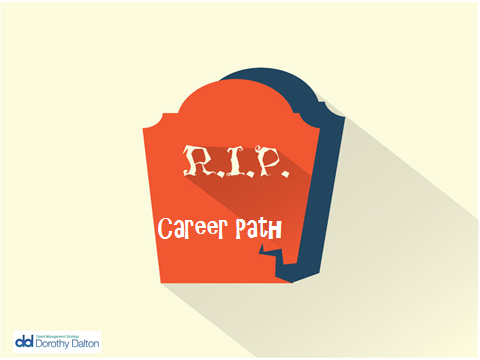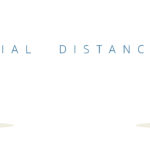What’s happening to the career path?
We all know the concept of having a career path has shifted. Initially this was almost imperceptible, but in the last few years, it is well.. dying, some would say already dead. We saw the arrival of the portfolio career and now I’m seeing the start something else. What I’m calling a cluster career.
That is a series of diversified professional activities. Not be confused with a career cluster which is quite different.
Linear Career on the wane
The notion of a vertically linear career path, is disappearing, at the same pace as agile and lean are commonplace. The expansion of the “gig”, on demand or collaborative economy is a key part of that shift. It is estimated that 25% of the total workforce will be working on demand.
In certain traditional professions, linear promotion may still apply for a while longer: law and, medicine, come to mind. But even those knowledge based professions will face change, as they are replaced by artificial intelligence.
Portfolio careers
We then saw the arrival of “Portfolio Careers,” where career management was based on the identification of transferable skills, which could be used in a range of sectors and functions. This was based on strengths and interests, to create a career strategy which met identified goals and allowed people to manage their own careers.
This approach was blocked by older school hiring managers with traditional mind sets, struggling to cope with a model that doesn’t fit a “copy paste” recruitment mode, which facilitates filling openings with “Mini-Mes”
Cluster Career
This concept has been taken a step further by the Cluster Career, with even further diversification, to include multiple, activities in seemingly unrelated fields.
It can be one activity at a time, in rotation. Pete (The Feet) is a marine engineer, who is also a chiropodist. Isabella is an auditor who responded to a recent call for graduates to retrain as maths and science teachers in the U.K. Elinor, trained as a lawyer, worked as a journalist, then as a media consultant. Olivia is an environmental scientist, turned tree surgeon.
Or it can be multiple activities simultaneously to suit demand: Martin, works in Instructional Design and as a chef and a hairdresser and switches between all to suit the market. Janice does ad hoc editorial and content marketing, plus beauty therapy (mani-pedi and massage.) Dylan, an events manager, works in a bar, as well as gigging as photographer.
What they have in common is fast and continuous learning skills, an ability to change direction, open mindedness and mental agility. They also have acute trend spotting skills.
Strategic diversification
For this type of career management to be effective, some key concepts have to be applied to take a strategic global overview of a career and then project long term. There has to be clear answers to the following two questions:
- Will my knowledge be needed by anyone? Ever?
Demand and supply for skills comes and goes. Technical skills gained in university are out of date before someone has graduated. The list of Jobs being automated gets longer every day. Knowledge and access to skill training is becoming easier, pushing down the earning power of certain skills, as competition increases because of over supply. We have seen that with the glut of life coaches on the market and social media “experts.” Pete-The-Feet is targeting the 65+ demographic, which after 2025 according to W.H.O. will represent 63% of the global population. Pete’s logic is “we all need feet”
- Will anyone want to pay for what I know?
The trick will be to position yourself on the right side of demand/supply curve, so that any professional activity you pursue, will generate enough revenue to pay your bills. Maslow’s hierarchy of needs is still out there. The talent will be to identify long term skill gaps, where certain competencies are in short supply and take the necessary steps to up-skill. This is a difficult one and why we have seen so many unemployed graduates, because high numbers are studying topics that will soon be obsolete. Any profession involved with the aging population will be in demand. The skills will presumably be anything that can’t be automated or robotized. Ironically, many seem to involve manual work.
Career Planning Today
Previously we have talked about pursuing a passion and finding the ideal career, as if it were one single object or objective. Most people embarking on a career will change jobs every 2-3 years. They are now more likely to be pursuing multiple professional activities, in sequence or concurrently. These activities may, or may not, have compatible transferable skills.
That will make career planning today more challenging. Having an open mind and being a life long learner will be critical. People are going to have more options than ever, which is going to make positioning and pitching, to what will eventually be a new breed of recruiters and hiring managers, who should be trained to assess diverse skills, across multiple disciplines. Currently at their core many are still conservative, but they will retire eventually.
The need to be self-aware, self-advocating, self-reliant, self- sufficient, self managing and self- promoting, maybe even self- taught and adaptable is going to increase.
The days when anyone took care of your career are over.
For all career coaching needs contact me NOW






Pingback: Leadership development: New Career Patterns
What a great post. The last line is so true. Not only are ‘careers’ becoming fuzzier but the responsibility for progression has squarely shifted to the individual. Even in today’s super companies you are witnessing a free for all form of career progression. Both candidates and recruiters will need to change and I agree with your point on learning being a key to success.
Thanks Ian – I agree the notion of what constitutes a career path is changing. Only recently I had my eyebrows threaded by a woman who owned a chain of beauty stalls in shopping malls in the North of England. Her other job was a university careers advisor!